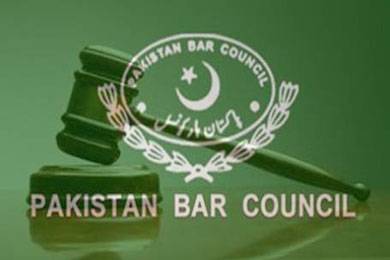ISLAMABAD - The legal fraternity and parliamentarians on Friday stressed the need for resisting any attempt against provincial autonomy and the 18th Amendment.
They further resolved that the validity of military courts should not be extended as these courts do not meet the standards of fair trial.
The consensus regarding the 18th Amendment, military courts and other issues relating to fundamental rights was developed during a dialogue between legal fraternity and parliamentarians.
The Asma Jahangir Legal Aid Cell together with the Pakistan Bar Council (PBC) had a dialogue with parliamentarians for implementation of legislation protecting fundamental rights.
The dialogue was aimed to engage the parliamentarians and the legal fraternity for a way forward on the recommendations that emerged from the Asma Jahangir Conference Justice for Empowerment 2018. None of the government representatives attended the event despite special invitation.
Legal fraternity was represented by office bearers Pakistan Bar Council (PBC), the lawyers’ apex body. These office bearers include PBC Vice Chairman Syed Amjad Shah, Chairman Executive Committee Hafiz Mohammad Idris and Chairman Human Rights Committee of PBC Abid Saqi.
Asma Jahangir Legal Aid Cell was represented by Executive Director Nida Aly, Afrasiab Khattak and Munizae Jahangir, member of the board.
PPP chairperson and head of Human Rights Committee of National Assembly Bilawal Bhutto Zardari attended the event.
Senator Mushahidullah Khan, Senator Sherry Rehman, Senator Mustafa Nawaz Khokhar, Senator Usman Kakar, Farhatullah Babar, MNAs Mohsin Dawar, Shaista Pervaiz, Nafeesa Shah and Chaudhry Manzoor also participated.
It has been resolved that the challenges to the 18th Amendment and the desire to roll back provincial autonomy and entitlements granted by the 18th Amendment as well as by the Constitution of 1973 generally, such as the National Finance Commission Award, must be resisted.
“The 19th Amendment related to Article 175-A (appointment of judges in superior judiciary) must be repealed,” the consultation meeting resolved. It emphasised that the role of the Parliamentary Committee in judicial appointments to the superior courts must be revived.
The participants of the meeting agreed that the military courts, a parallel justice system, impede access to justice and do not meet standards of fair trial.
“They should not be extended as they are given jurisdiction over civilians and used against them. The criminal justice system should be strengthened instead,” they resolved.
They stressed that the state must fulfil its responsibility to protect fundamental rights of citizens and demanded of the government to take steps against harassment of human rights defenders and lifting the ban on International and National Non Governmental Organizations.
The participants said that there should be effective implementation of merger and reforms in western districts of Khyber Pakhtunkhwa, formerly FATA, as approved by parliament.
The participants of the dialogue also resolved that women of western districts of KP, formerly FATA, should be given representation in the National Commission for the Status of Women (NCSW) and should be included in the reform process.
Lawyers and parliamentarians emphasized on effective legislation and its enforcement against enforced conversions.
On Cyber laws, the conference resolved there should be training of judges, lawyers and the cyber-crime wing on Prevention of Electronic Crimes Act. The parliament should review the laws to remove draconian provisions of Cyber Crime Law.
“There should be enactment of Data Protection Law which covers all public bodies such as NADRA and Safe Cities. When formulating legislation all stakeholders must be involved.”
The participants expressed their concerns on non-implementation of law on sexual harassment against women in the workplace and said that the parliament both federal and provincial assemblies have not constituted committees on sexual harassment as mandated by the law.
The PPP leaders expressed their unfaltering support on abolishing the death penalty. There was clear consensus between the lawyers and the PPP, PKMAP that currently the system does not provide due process of law and until this is in place, death penalty leads to irrevocable gross injustice. The moratorium on death penalty should be restored.
The Asma Jahangir Legal Aid Cell and the PBC has formed a committee and pledged to work in coordination with parliamentarians to formulate pro people legislation protecting human rights and legal reforms.






